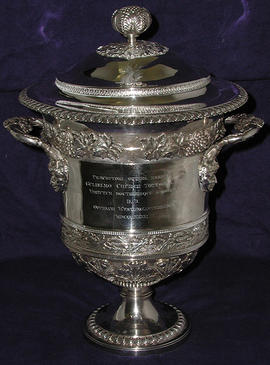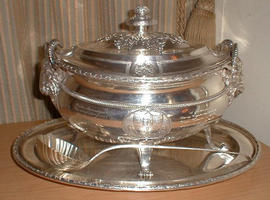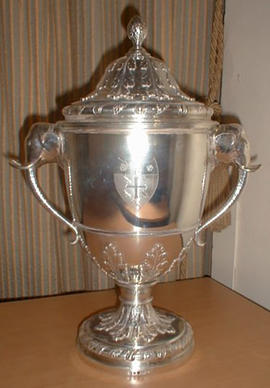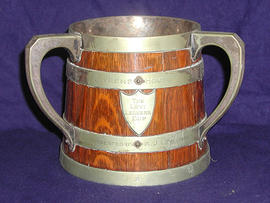A circular bowl, the body half fluted, the upper part decorated with swags, engraved "Presented by R T Squire, President of the Elizabethan Club 1955" UNLOCATED - detail appears on Sotheby Valuation of 13 July 1981 and Spink & Son valuation of 28 Feb 1979. Unlocated.
Taylor, Joseph, 1767-1827An adaptation of the 19th Century German fairy tale by Wilhelm Hauff. The narrative is set in the Middle East and follows Little Muck, who is forced to leave his home after his father dies. Out of desperation, he agrees to care for a woman's many cats in exchange for food and lodging. But he grows dissatisfied and manages to escape his enslavement by stealing her magic slippers and magic cane. The slippers enable the wearer to run extremely fast, and the cane leads its owner to buried treasure. Little Muck enters the service of the king as a messenger, after he wins a race against the king's fastest runner. Rising so high in the king's favour, however, causes the king's loyal advisors to turn against Little Muck. Little Muck discovers some buried treasure in the king's garden, and attempts to buy the friendship of the king's advisors. The king grows suspicious of Little Muck's newfound wealth and he is thrown into prison for stealing from the Treasury. In order to avoid being executed, Little Muck confesses to the magic of the slippers and cane. The king confiscates these, and banishes Little Muck from the kingdom. While the exiled Little Muck is roaming the wild forests, he stumbles across some magic figs which give an enormous nose and ears to anyone who eats them. Seizing the opportunity for revenge, Little Muck adopts a disguise and brings a basket of the magic figs to the king's court, who all partake of the figs. When they realise what has happened, the king begs Little Muck to restore them to normal, but Little Muck refuses and, taking his slippers and cane with him, disappears out of the window.
An adaptation of the 1841 comic poem by Francis W.N. Bayley entitled 'The New Tale of a Tub'. The narrative follows two colonial hunters as they are attacked by a tiger, but eventually manage to trap it in a large wooden barrel. The tiger's tale comes through a hole in the tub, and the hunters tie a knot in it to prevent the tiger being able to escape. Many of the slides have damage to the black tape binding. The complete set of digitised images of these slides can be seen online at http://www.slides.uni-trier.de/set/index.php?id=3005075 [accessed 06/10/2015]
A classical vase shaped cup and cover with handles, engraved with a Latin inscription 'Praeceptori optime merenti Gulielmo Church Totton A.M', applied with a band of vine mask terminated cornucopia handles, the cover engraved with the School arms below finial, one leaf missing, some overall dents. Cover [engraved with school arms] Not loaded.
Joseph William Story and William ElliotAn oval soup tureen and cover,with goat's head mask handles, ornamental edge and beaded moulding, embossed and fluted on four scroll leaf feet, on tray, with liner, all pieces fully marked, engraved with the School armorials and motto . Makers Mark reads W. H.
A George III silver challenge cup and cover, with applied leaf decoration on lower part and lid, with elephant head and trunk handles, engraved with coat-of-arms and inscription in Latin with names of donors, inscribed T. Whipham Fecit, Fleet Street, oak case, repaired finial.
Robins, John, d. 1831Standard Glass Slide (3¼"). 2 of 12: the hostel on the side of the mountain.
Theobald & Co., LondonInscription: 'Wrens House The Levi Leavers Cup presented by A.J. Levi 1950'. No cover. 3 handles, 1 has come off - needs soldering. Donor: A.J. Levi, 1950. Awarded: 1950.
Glass Plate Negative (164mm x 120mm). The cuneiform inscription carved into the mountain side.
Glass Plate Negative (164mm x 120mm). The cuneiform inscription carved into the mountain side.



